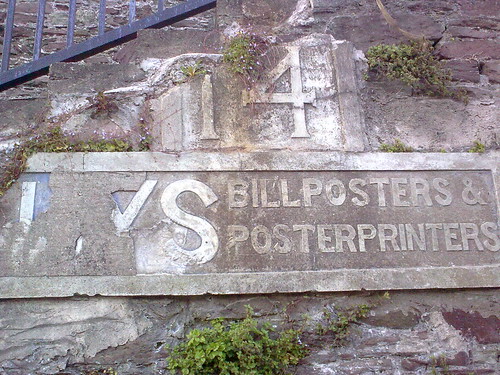Sunday, April 19, 2009
Blueface - are ye that desperate ?
Tuesday, April 14, 2009
The oh so slow move to Vodafone
On signup I received an email telling me it would be up to 10 days to change the phone and 21 for the broadband.
Two weeks after signup I got a letter with the same information which was a tad worrying.
Today I'm still none the wiser. No further communication from Vodafone or even a goodbye letter from my previous provider.
Strange how I could change electricity provider in around 3 weeks but yet the supposedly mature broadband process takes an age.
Sunday, April 12, 2009
Saturday, April 11, 2009
What is it with the Irish Times & Aer Lingus ?
Wednesday, April 08, 2009
Interesting article about stockbroking economists.
The game is up for stockbroker economists - Fintan O'Toole
The stockbrokers who are telling the Government what to do about the economic crisis are the ones who did not see the slump coming, writes FINTAN O'TOOLE .
IF YOU followed the advice of the expert tipsters on Saturday, you put your hard-earned euro on Butler’s Cabin, My Will, Black Apalachi or Rambling Minster to win the Grand National.
When all of them were beaten by a 100/1 outsider you probably concluded that you’d have been better off ignoring the tipsters and picking a horse at random.
In fact, you probably knew that anyway. Expert predictions of the outcome of horse races are just part of the fun. If you believe they have a real relationship with the truth, you’ve got a one-way ticket to la-la land.
There’s another form of organised gambling called the stock exchange and it has its own breed of tipsters.
Stockbroker economists employ similar methods to their confreres in the bookies and racing pages. They study the form (past trends). They pick up scraps of inside information. They try to figure out the weather and the going. And, however wrong they were the last time, they affect an air of absolute confidence in their current powers of analysis.
Which is all fine, all part of the fun. Except that, while their cousins in the turf accountancy field are accepted as loveable chancers, the stockbrokers are accorded a solemn respect.
Last week, the three big stockbroking firms, Davy, Goodbody and NCB, got together to issue a pastoral letter on the economic crisis and today’s budget.
They served up, with a side order of implacable rectitude, a familiar stew of solutions. More money for the banks. Pay cuts for the masses. Cut social welfare. Tax low-paid workers. Means-test child benefit and other payments. Abolish stamp duty on residential property. Avoid tax increases.
Everything except an attempt to ensure that those who have benefited most should take the most pain. This formula is essentially a political broadcast on behalf of the party of the rich. It is taken seriously, though, because it comes from skilled economists who are assumed to know more about these things than the rest of us.
Just as racing tipsters know a lot about horses, trainers and jockeys, the stockbrokers know a lot about the movements of money. Except that, in practice, the predictions that sound like they’re straight from the horse’s mouth often emanate from the other end of the animal.
Is the NCB that is now telling us how to get out of the crisis by any chance related to the firm of the same name that couldn’t pick a crisis out of a line-up comprising 10 blissed-out cherubs and one satanic monster?
Eunan King, NCB’s chief economist, was doing his best Little Miss Sunshine impersonation in the Irish Independent just a year ago: “The gloom about the outlook for the Irish economy generated by the downturn in the housing market is misplaced . . . the conditions for a spiral down and a recession in the economy are not present. Housebuilding was not the engine of the boom and should not be the cause of a bust.”
The economic downturn in the US “should not have a material impact on Ireland . . . In summary, the housing market does not appear likely to crash.”
As late as last May, NCB was dismissing the “bearish arguments” that the Irish economy was in trouble, insisting that “the housing slowdown in 2007 did not weaken the overall economy substantially”, and predicting annual growth rates of 5 per cent to 6 per cent in 2008 and 2009.
Davy told us in March 2007 that “the housing downturn is relatively contained” and predicted that house completions in 2008 would be 75,000 – the actual number was 50,000.
At the same time, while the subprime crisis was unfolding in the US, triggering the worst global depression for 70 years, Davy couldn’t see what the problem was. It told us blithely that “it is hard to believe that, in themselves, these sorts of developments will bring the US consumer and the US economy tumbling down”.
Goodbody, meanwhile, practically patented the phrase “soft landing” – a formula it applied year after year to the Irish property market and the Irish economy in general.
Bear in mind that all of this optimism wasn’t even conventional wisdom.
Every historically literate economist knew for sure that the Irish property boom was going to crash. As early as August 2000, the International Monetary Fund put the Irish bubble in the context of all known modern property booms and concluded that “there has not been a single experience of price inflation on the scale of Ireland’s which did not end in prices falling”. Given that prices actually doubled in the six years after that warning, the scale of the crash was utterly predictable.
Stockbrokers didn’t see the obvious – for one simple reason. Stockbrokers are about as likely to tell you that the system is in big trouble as racing tipsters are to tell you that gambling on horses is a mug’s game. They both have to believe that the next big win is just around the corner. The truth that their game is up is as inconceivable to them as it should be evident to the rest of us.
Thursday, April 02, 2009
Dear Mr Bowen Construction
The next time that you are stopped at the Dunkettle Roundabout please dispose of your cigarette in the ashtray of your XXX rather than chucking it out the window.
Maybe we should have rung the "how's my driving number" and quoted your number XXX rather than just asking you to pick it up ?




